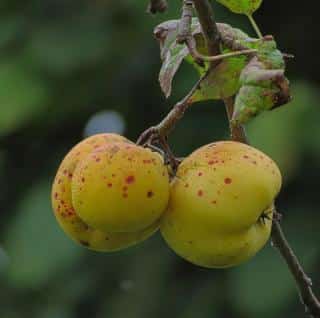

A fungal disease that strikes terror in the heart of orchards, scab can be diagnosed when brown spots appear on fruits.
Advice on keeping it from appearing and getting rid of it.
Read also:
Although it also infects medlar and plum, it is most famous for infecting pear tree and apple tree for which scab is known to provoke devastation. Fruits on infected trees start showing brown spots that make the fruit rot as they spread across the flesh.
Spores from a fungus that overwintered on dead leaves are responsible for this contamination. First, the tree’s leaves are covered with velvety spots during the primary infection.
Things can stop there, but if it is a rainy summer, spores propagated by the spots on the leaves will germinate on the flowers and fruits of the tree. This is called secondary infection.

Scab is expected to appear in regions with rainy springs and summers. In those areas, best is to choose heirloom varieties that have learned how to resist scab: ‘Belle de Belle de Boskoop’, ‘Reinettes du Mans’ or ‘Reinette des Flandres’ for apples; and ‘Conference’ or ‘Williams’ for pears. Certain recent varieties such as ‘Ariane’ for apples have been developed to resist it.
Oppositely, varieties such as the ‘Golden’ or the ‘Orange Cox’ for the apples, and ‘Beurré Hardy’ or ‘Beurré Giffard’ for pears and their hybrids are particularly sensitive to scab.
Ask your local horticulturist about scab when buying your fruit tree.
Laure Hamann